
(NOTE: This critical analysis of the moral choices of inFAMOUS will contain story spoilers.)
It seems that ever since BioShock let you choose whether to save or to harvest the Little Sisters, "moral choices" have become the newest fad for modern videogames. Often, this mechanic seems forced or clumsily executed, but when done correctly, challenging a player's core beliefs can be one of the gaming industry's most powerful tools for engaging players.
inFAMOUS is the most recent game to be released to put a heavy emphasis on moral choices, asking the player to act based on complex situations and live with the consequences. As expected, some people loved it while others hated it, but the real question is: Does it work?
Well, yes and no. Let's break it down:

Whenever the player triggers a "Karma Moment," the game stops, the screen is colored gold, and Cole narrates reasons why both options make sense. By beating the player over the head like this, inFAMOUS lessens the impact of many of these choices, but without it, you probably wouldn't even be able to tell that you were facing a significant moment.
For instance, at one point, the player faces down a hulking golem creature that is about to throw a gas tank directly at him. There's a mass of wounded people within feet of this gas tank, so Cole surmises that he can either fry the tank, which would blast the golem's arm off but incinerate all those people in the process, or let the golem throw it to make sure no one but himself gets hurt.
If the game hadn't stopped, sat you down, and explained the situation to you like a toddler, it's likely you'd never have known the possible ramifications of that act. It just wasn't obvious that those people lying on the ground were any different than the people always lying all over the sidewalk.
But moments like that occur all the time in inFAMOUS without any gold coloring or exposition: I was fighting two enemies in the street, and they took cover behind a parked car. Behind them were a couple civilians, at least one injured. Now, I could use my shockwave attack to flip the car at them, but it'd probably hurt the people behind them too. Or I could risk running around the car to take them out with melee attacks, but I'd probably get shot a few times in the process. What should I do?
So it seems silly to stop the whole game and painfully detail the consequences of the kind of dilemma the player faces all the time.

The worst offenders, though, are the moments when the game literally boils the whole system down to "press X to be good or press triangle to be evil." The last moral choice you make in the game involves Cole finding the Raysphere, the device that gave him his powers in the first place at the cost of about a thousand innocent lives. The game pauses and Cole contemplates destroying the Raysphere to ensure it can't fall into the wrong hands, or using it again to become even more powerful. The game then gives you the option of pressing X to destroy the Raysphere, or triangle to activate it.
This choice directly clashes with the comments of Brian Oberg, co-founder of Sucker Punch Productions, the developer of inFAMOUS. Prior to the game's release, he was quoted saying that "good and evil in inFamous is not just a binary choice." However, that's exactly what that choice was, and it was also the final moral choice the game had to offer.
That choice is also arguably the most important one because, if you choose to activate the Raysphere, it doesn't matter how good you've been, always choosing the good options and helping people, you are now locked into the evil ending to the game and marked permanently "Infamous" on the game's Karma scale. Again, this stands in direct contradiction to Oberg's statements since he mentioned being able to "go back and forth" between good and evil.

Oberg discussed how "depending on where you are in the game you may want to actually play a mission with certain sets [of powers], and it may actually make sense for you to maybe become more evil to play a particular mission."
First of all, the way the Karma system works, you'd have to spend hours grinding your way back and forth on the Karma scale to actually go unlock the other set of powers. There is no way anyone playing inFAMOUS seriously spent that much time trying to flip-flop between good and evil powers just so they'd have the arc lightning power instead of the overload power for one mission. It would take ages, and the two sets aren't different enough to justify it.
Second, doesn't that defeat the importance of moral choices in inFAMOUS altogether, if you're merely being good or evil based solely on which powers you want rather than what you believe to be the appropriate response to each situation?
It's unfortunate, but you really need to decide whether you're going to play as good or evil before you even start the game. There's no incentive for staying in the moral gray area, only punishment. Certain upgrades are only available depending on how good or evil you are, so if you're staying somewhere near the middle, sometimes choosing good and other times evil, the game punishes you. It locks you out of upgrading your main powers, so you really need to be an extremist one way or the other.
What this system amounts to is that you know which way you're going to swing before the game even presents you with the next choice, even if you disagree, simply because it would be foolish to pick otherwise.

An unexpected effect the game had on me in regard to powers was that I found myself role-playing the traditional good superhero or the evil villain. The first time I played through the game, I strictly adhered to the good path, healing almost every injured citizen I came across or surgically taking down stray enemies. If I accidentally shocked a citizen, I immediately rushed to heal him. I usually landed as gently as possible using the air thrusters, which must look truly heroic from a citizen's standpoint. And I never, ever let a hostage die.
Playing through the second time as evil was liberating. I'd kick injured civilians or drain the life from them if I needed it. I only bothered to take down enemies if they got in my way or took the first shot, and I was never concerned with collateral damage. Occasionally, I'd go out of my way to ensure that hapless civilians would get hurt. I usually landed with a thunder drop, causing a lot of splash damage every time. And I always, always killed hostages.
I wouldn't necessarily call that totally the game's doing, because I tend to role-play in character-driven games anyway. However, inFAMOUS definitely influences you to play the role of your hero or villain as well with the Karma system, awarding points here and there to swing the balance of your moral standing, even for little actions like healing or hurting one random citizen. In this way, it keeps the good player in check by not letting him go on a mindless rampage without consequence and the evil player in check by reminding him that he's not supposed to be healing anyone since he's, you know, evil.
The more significant cracks in the system come with the more significant choices.

Far and away, the biggest problem I see in inFAMOUS' moral choices is that most of the time, you really don't have a choice. In that example I mentioned earlier, where you must decide either to destroy the Raysphere or to activate it, it really doesn't matter what you pick. That Raysphere is going to activate regardless and it is going to kill John, the character that helped you find it.
But that's not the only point in the game where it wants you to feel like you're making more of an effect than you really are.
There's a point in the game, my favorite point actually, where Kessler, Cole's main antagonist, has armed several bombs around a section of the city with civilians trapped at each one. If Cole fails to disarm even one, they'll all blow up. So as Cole, you rush around the city, taking out enemies as efficiently as possible to rescue people, until you finally reach the climax of the mission: Kessler presents you with two buildings. From one dangles six doctors; from the other, Cole's girlfriend, Trish. There's time enough to save one, so which will you choose?

Honestly, the game floored me for a moment when I got to that point. While it wasn't an original concept, I couldn't remember the last time a videogame had given me that kind of a choice. I panicked in that moment, agonizing over who to save, and loved that a videogame was having that kind of effect on me. Of course, that feeling was totally ruined when I realized that I needed to pick the good option and save the doctors, but not because I wanted to. No, I needed to save the doctors since I was already playing as good and it made no sense from a gameplay standpoint to save Trish and take the evil Karma hit.
To make matters worse, it really doesn't matter which option you choose: Trish is going to die. Either you picked the doctors and she fell because that was your choice, or you picked to save Trish but it turned out that Kessler had pulled a Joker from The Dark Knight and switched them around, so that Trish was actually with the doctors.
Talking specifically about this point in the game, Sucker Punch's game director, Nate Fox, said that "it isn’t a black and white choice, but that’s what makes it a good one." He's right: Saving Trish really isn't an evil act; it's just a selfish one. But the game categorizes it as either black or white, rewarding either good or evil Karma. It's totally binary and Trish dies either way.
So why give me the choice if they both result in the same thing?

Finally, a lot of these choices would be more powerful if the characters were more likable. Cole's best friend, Zeke, is annoying as hell from the very beginning and only gets immeasurably more so as the game continues. Trish is a total, complete bitch from the start who I couldn't bring myself to care at all about.
It didn't matter how much good I did in the city, how many people I healed, or how much I sacrificed, Trish still viewed me as a terrorist and refused to listen until the moment when I decided not to save her and she fell to her death. Then, of course, she forgave me. Yeah, okay. So why was I supposed to care about her again?
The citizens of Empire City are usually no better. Heal one and they might say "thanks" before casually walking off like nothing happened. Occasionally they'll snap photos of you, which can be funny, or cheer in an embarrassing "you're playing a videogame!" way. Sometimes, if you've cleared a section of the city, the citizens might help you by throwing rocks at a stray enemy until he goes down, and that's definitely encouraging to see. But in general terms, citizens don't present a good motivation unless you're playing as evil, in which case they'll throw rocks at you, becoming a big motivator to be more evil.

By the time I finished inFAMOUS on my good playthrough, I was so pissed off at most of the characters I'd sacrificed so much to protect that playing as evil was a breath of fresh air. But not as much as I thought it would be.
Going down the evil path isn't really as evil as you'd expect. You're still saving people and doing the same things you'd do if you were going down the good path. Why would evil Cole care about saving random citizens? He kills random citizens all the time.
So it would have been cool to see the evil path be truly evil rather than just a slightly modified version of the good path. Though it's totally worth it to play as evil by the end of the game because you're rewarded with black lightning bolts and a blood-red sky. Awesome.
Even though many of inFAMOUS' moral choices fall flat, the mechanic itself is definitely still interesting. The stark moral choices and Karma system are really more bothersome in retrospect than in practice. In the context of the game, they don't offend nearly as much as you might expect as you get used to Cole's gravely exposition detailing his every thought. It just becomes part of the experience.
inFAMOUS is a totally awesome game that I still hope everyone gets to playat some point now, but let's hope the moral choices in the inevitable sequel are much more meaningful and thought out.






It seems that ever since BioShock let you choose whether to save or to harvest the Little Sisters, "moral choices" have become the newest fad for modern videogames. Often, this mechanic seems forced or clumsily executed, but when done correctly, challenging a player's core beliefs can be one of the gaming industry's most powerful tools for engaging players.
inFAMOUS is the most recent game to be released to put a heavy emphasis on moral choices, asking the player to act based on complex situations and live with the consequences. As expected, some people loved it while others hated it, but the real question is: Does it work?
Well, yes and no. Let's break it down:

Press X To Be Good or Triangle To Be Evil
Whenever the player triggers a "Karma Moment," the game stops, the screen is colored gold, and Cole narrates reasons why both options make sense. By beating the player over the head like this, inFAMOUS lessens the impact of many of these choices, but without it, you probably wouldn't even be able to tell that you were facing a significant moment.
For instance, at one point, the player faces down a hulking golem creature that is about to throw a gas tank directly at him. There's a mass of wounded people within feet of this gas tank, so Cole surmises that he can either fry the tank, which would blast the golem's arm off but incinerate all those people in the process, or let the golem throw it to make sure no one but himself gets hurt.
If the game hadn't stopped, sat you down, and explained the situation to you like a toddler, it's likely you'd never have known the possible ramifications of that act. It just wasn't obvious that those people lying on the ground were any different than the people always lying all over the sidewalk.
But moments like that occur all the time in inFAMOUS without any gold coloring or exposition: I was fighting two enemies in the street, and they took cover behind a parked car. Behind them were a couple civilians, at least one injured. Now, I could use my shockwave attack to flip the car at them, but it'd probably hurt the people behind them too. Or I could risk running around the car to take them out with melee attacks, but I'd probably get shot a few times in the process. What should I do?
So it seems silly to stop the whole game and painfully detail the consequences of the kind of dilemma the player faces all the time.

The worst offenders, though, are the moments when the game literally boils the whole system down to "press X to be good or press triangle to be evil." The last moral choice you make in the game involves Cole finding the Raysphere, the device that gave him his powers in the first place at the cost of about a thousand innocent lives. The game pauses and Cole contemplates destroying the Raysphere to ensure it can't fall into the wrong hands, or using it again to become even more powerful. The game then gives you the option of pressing X to destroy the Raysphere, or triangle to activate it.
This choice directly clashes with the comments of Brian Oberg, co-founder of Sucker Punch Productions, the developer of inFAMOUS. Prior to the game's release, he was quoted saying that "good and evil in inFamous is not just a binary choice." However, that's exactly what that choice was, and it was also the final moral choice the game had to offer.
That choice is also arguably the most important one because, if you choose to activate the Raysphere, it doesn't matter how good you've been, always choosing the good options and helping people, you are now locked into the evil ending to the game and marked permanently "Infamous" on the game's Karma scale. Again, this stands in direct contradiction to Oberg's statements since he mentioned being able to "go back and forth" between good and evil.

Power Tripping Over Itself
Oberg discussed how "depending on where you are in the game you may want to actually play a mission with certain sets [of powers], and it may actually make sense for you to maybe become more evil to play a particular mission."
First of all, the way the Karma system works, you'd have to spend hours grinding your way back and forth on the Karma scale to actually go unlock the other set of powers. There is no way anyone playing inFAMOUS seriously spent that much time trying to flip-flop between good and evil powers just so they'd have the arc lightning power instead of the overload power for one mission. It would take ages, and the two sets aren't different enough to justify it.
Second, doesn't that defeat the importance of moral choices in inFAMOUS altogether, if you're merely being good or evil based solely on which powers you want rather than what you believe to be the appropriate response to each situation?
It's unfortunate, but you really need to decide whether you're going to play as good or evil before you even start the game. There's no incentive for staying in the moral gray area, only punishment. Certain upgrades are only available depending on how good or evil you are, so if you're staying somewhere near the middle, sometimes choosing good and other times evil, the game punishes you. It locks you out of upgrading your main powers, so you really need to be an extremist one way or the other.
What this system amounts to is that you know which way you're going to swing before the game even presents you with the next choice, even if you disagree, simply because it would be foolish to pick otherwise.

An unexpected effect the game had on me in regard to powers was that I found myself role-playing the traditional good superhero or the evil villain. The first time I played through the game, I strictly adhered to the good path, healing almost every injured citizen I came across or surgically taking down stray enemies. If I accidentally shocked a citizen, I immediately rushed to heal him. I usually landed as gently as possible using the air thrusters, which must look truly heroic from a citizen's standpoint. And I never, ever let a hostage die.
Playing through the second time as evil was liberating. I'd kick injured civilians or drain the life from them if I needed it. I only bothered to take down enemies if they got in my way or took the first shot, and I was never concerned with collateral damage. Occasionally, I'd go out of my way to ensure that hapless civilians would get hurt. I usually landed with a thunder drop, causing a lot of splash damage every time. And I always, always killed hostages.
I wouldn't necessarily call that totally the game's doing, because I tend to role-play in character-driven games anyway. However, inFAMOUS definitely influences you to play the role of your hero or villain as well with the Karma system, awarding points here and there to swing the balance of your moral standing, even for little actions like healing or hurting one random citizen. In this way, it keeps the good player in check by not letting him go on a mindless rampage without consequence and the evil player in check by reminding him that he's not supposed to be healing anyone since he's, you know, evil.
The more significant cracks in the system come with the more significant choices.

The Illusion of Choice
Far and away, the biggest problem I see in inFAMOUS' moral choices is that most of the time, you really don't have a choice. In that example I mentioned earlier, where you must decide either to destroy the Raysphere or to activate it, it really doesn't matter what you pick. That Raysphere is going to activate regardless and it is going to kill John, the character that helped you find it.
But that's not the only point in the game where it wants you to feel like you're making more of an effect than you really are.
There's a point in the game, my favorite point actually, where Kessler, Cole's main antagonist, has armed several bombs around a section of the city with civilians trapped at each one. If Cole fails to disarm even one, they'll all blow up. So as Cole, you rush around the city, taking out enemies as efficiently as possible to rescue people, until you finally reach the climax of the mission: Kessler presents you with two buildings. From one dangles six doctors; from the other, Cole's girlfriend, Trish. There's time enough to save one, so which will you choose?

Honestly, the game floored me for a moment when I got to that point. While it wasn't an original concept, I couldn't remember the last time a videogame had given me that kind of a choice. I panicked in that moment, agonizing over who to save, and loved that a videogame was having that kind of effect on me. Of course, that feeling was totally ruined when I realized that I needed to pick the good option and save the doctors, but not because I wanted to. No, I needed to save the doctors since I was already playing as good and it made no sense from a gameplay standpoint to save Trish and take the evil Karma hit.
To make matters worse, it really doesn't matter which option you choose: Trish is going to die. Either you picked the doctors and she fell because that was your choice, or you picked to save Trish but it turned out that Kessler had pulled a Joker from The Dark Knight and switched them around, so that Trish was actually with the doctors.
Talking specifically about this point in the game, Sucker Punch's game director, Nate Fox, said that "it isn’t a black and white choice, but that’s what makes it a good one." He's right: Saving Trish really isn't an evil act; it's just a selfish one. But the game categorizes it as either black or white, rewarding either good or evil Karma. It's totally binary and Trish dies either way.
So why give me the choice if they both result in the same thing?

A Man Without A Country
Finally, a lot of these choices would be more powerful if the characters were more likable. Cole's best friend, Zeke, is annoying as hell from the very beginning and only gets immeasurably more so as the game continues. Trish is a total, complete bitch from the start who I couldn't bring myself to care at all about.
It didn't matter how much good I did in the city, how many people I healed, or how much I sacrificed, Trish still viewed me as a terrorist and refused to listen until the moment when I decided not to save her and she fell to her death. Then, of course, she forgave me. Yeah, okay. So why was I supposed to care about her again?
The citizens of Empire City are usually no better. Heal one and they might say "thanks" before casually walking off like nothing happened. Occasionally they'll snap photos of you, which can be funny, or cheer in an embarrassing "you're playing a videogame!" way. Sometimes, if you've cleared a section of the city, the citizens might help you by throwing rocks at a stray enemy until he goes down, and that's definitely encouraging to see. But in general terms, citizens don't present a good motivation unless you're playing as evil, in which case they'll throw rocks at you, becoming a big motivator to be more evil.

By the time I finished inFAMOUS on my good playthrough, I was so pissed off at most of the characters I'd sacrificed so much to protect that playing as evil was a breath of fresh air. But not as much as I thought it would be.
Going down the evil path isn't really as evil as you'd expect. You're still saving people and doing the same things you'd do if you were going down the good path. Why would evil Cole care about saving random citizens? He kills random citizens all the time.
So it would have been cool to see the evil path be truly evil rather than just a slightly modified version of the good path. Though it's totally worth it to play as evil by the end of the game because you're rewarded with black lightning bolts and a blood-red sky. Awesome.
Even though many of inFAMOUS' moral choices fall flat, the mechanic itself is definitely still interesting. The stark moral choices and Karma system are really more bothersome in retrospect than in practice. In the context of the game, they don't offend nearly as much as you might expect as you get used to Cole's gravely exposition detailing his every thought. It just becomes part of the experience.
inFAMOUS is a totally awesome game that I still hope everyone gets to play














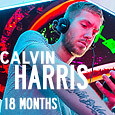

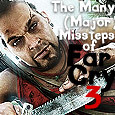
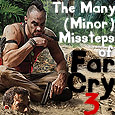
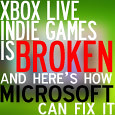
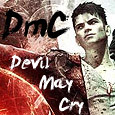







I very desperately want to read this. Before you were able to remove the ".blogspot" part of the wesbite title, I would refresh the site every day, and this would be staring me in the face. I haven't completed inFAMOUS, but I want to read more on the moral system that the game has, and others opinions of it. I'll force myself to finish the game soon enough, and I'll be able to leave a more worth-while comment.
ReplyDeleteHaha, it's cool, man. This is pretty much exactly the reason I felt like it was necessary to make all the "Archive" sidebar stuff. Finish it at your own pace.
ReplyDeleteSo... I agree. There really isn't much more I can say about this, you covered nearly all the moral aspects of inFAMOUS.
ReplyDeleteThe moral choices played a slight bit into the story, but overall didn't have much of an impact. I was slightly disappointed with the link between the narrative and moral choices, but the story was incredibly well done and I could overlook this.
The end was rather excellent. To say it tied many knots would be a lie, but it certainly delivered a reasonable and somewhat thought-provoking twist. Very enjoyable game, as you said.
I certainly hope we see better moral choice systems in games, however. inFAMOUS' left a lot to be desired. I hardly found my own morals taxed by the many choices, and I wish there would come a game that could fill that gap.
The link between the story and moral stuff is something that really bothered me. I haven't tested this, but I assume that if you play as evil, you can save the doctors and Trish will still praise you, or play as good and she'll curse your name for trying to save her.
ReplyDeleteAgain, haven't tested that, but I doubt they produced four cut scenes for that situation. I think they just did two: one good, one evil.
Yeah, I really like the end. Rather than wrapping a lot of stuff up, it wrapped up one huge detail and then opened up a bunch of other stuff for the future in a way that doesn't just feel like they cut the ending of the game short (Halo 2).
Your website is really cool!!Another thing I find when I’m browsing the web or reading a great how-to post—I want to actually use that information, but not necessarily at the time I find it. So instead of possibly forgetting about what a great idea it is..
ReplyDeletespotify premium gratuit
Kyrie Irving Shoes
ReplyDeleteAir Jordan 11
Jordan 11
Pandora Jewelry Official Site
Red Bottom Shoes
Pandora Outlet
Pandora Jewelry Official Site
Yeezy boost 350 v2
Air Max 270
Nicole20180912